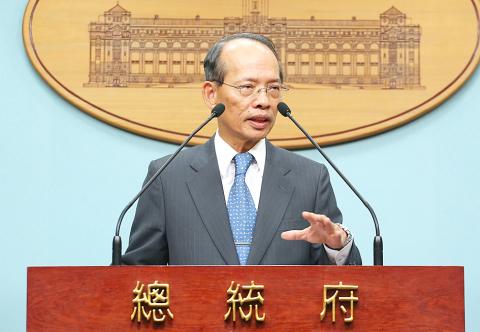The Ministry of Foreign Affairs yesterday said President Tsai Ing-wen (蔡英文) would interact naturally with representatives of China and other nations without diplomatic ties with Taiwan at the inauguration ceremony of the newly expanded Panama Canal later this month, as it released more details of Tsai’s first overseas state visit.
“From the ministry’s understanding, China will be sending the deputy head of its Ministry of Commerce’s Department of Outward Investment and Economic Cooperation, who is relatively low-ranking, to attend the ceremony,” Deputy Minister of Foreign Affairs Javier Hou (侯清山) told a news conference at the Presidential Office.
Hou said Tsai is expected to have “natural interactions” with Beijing’s representative at the ceremony on June 26 in Panama, just as she would with representatives of Taiwan’s other non-diplomatic allies.

Photo: CNA
It means Tsai would not be indifferent to the representatives should they approach to say hello and might respond by giving a nod, Hou said, adding that Tsai is also likely to hold bilateral meetings with the leaders of the nation’s nine diplomatic allies invited to attend the ceremony.
According to Tsai’s itinerary, she is to embark on her nine-day trip on Friday next week and arrive the next day in Panama, where she is scheduled to attend the inauguration ceremony on June 26 before departing for Paraguay the next day.
During her stay in Paraguay, Tsai is to meet with Paraguayan President Horacio Cartes and deliver a speech to the parliament, before leaving on June 30.
Tsai’s chartered plane is set to touch down at Taiwan Taoyuan International Airport on July 2.
The president is to be accompanied by National Security Council Secretary-General Joseph Wu (吳釗燮), Presidential Office deputy secretaries-general Jason Liu (劉建忻) and Harry Tseng (曾厚仁), Minister of Foreign Affairs David Lee (李大維) and seven businesspeople from the food, solar energy, high-tech textiles and power generation sectors.
Hou said the government is hoping to demonstrate its sincerity in strengthening ties with its diplomatic allies through Tsai’s visit, which he termed the Ying Hsiang Project (英翔專案).
Given the nation’s allies’ expectations to enhance bilateral trade and investment ties, Hou said the president’s overseas visit has also set itself the mission of encouraging Taiwanese companies to make investment trips to the nations in the hopes of creating mutually beneficial relationships.
“In addition to visiting the two diplomatic allies, Tsai is also scheduled to transit through two US cities: Miami on her way to Panama and Los Angeles on her way back,” Hou said, adding that Taipei and Washington are still ironing out the details of the stops.
Asked whether China is upset by Tsai’s transit stops in the US and whether the government has sought to communicate with Beijing on the matter, Hou said Tsai’s overseas state visit is a matter for Taiwan to decide without sounding out the opinions of other nations.
“We have established a tacit understanding with the US and it is the primary nation with which we have coordinated,” Hou added.

TRUST: The KMT said it respected the US’ timing and considerations, and hoped it would continue to honor its commitments to helping Taiwan bolster its defenses and deterrence US President Donald Trump is delaying a multibillion-dollar arms sale to Taiwan to ensure his visit to Beijing is successful, a New York Times report said. The weapons sales package has stalled in the US Department of State, the report said, citing US officials it did not identify. The White House has told agencies not to push forward ahead of Trump’s meeting with Chinese President Xi Jinping (習近平), it said. The two last month held a phone call to discuss trade and geopolitical flashpoints ahead of the summit. Xi raised the Taiwan issue and urged the US to handle arms sales to

A magnitude 5.6 earthquake struck off the coast of Yilan County at 12:37pm today, with clear shaking felt across much of northern Taiwan. There were no immediate reports of damage. The epicenter of the quake was 16.9km east-southeast of Yilan County Hall offshore at a depth of 66.8km, Central Weather Administration (CWA) data showed. The maximum intensity registered at a 4 in Yilan County’s Nanao Township (南澳) on Taiwan’s seven-tier scale. Other parts of Yilan, as well as certain areas of Hualien County, Taipei, New Taipei City, Taoyuan, Hsinchu County, Taichung and Miaoli County, recorded intensities of 3. Residents of Yilan County and Taipei received

Taiwan has secured another breakthrough in fruit exports, with jujubes, dragon fruit and lychees approved for shipment to the EU, the Ministry of Agriculture said yesterday. The Animal and Plant Health Inspection Agency on Thursday received formal notification of the approval from the EU, the ministry said, adding that the decision was expected to expand Taiwanese fruit producers’ access to high-end European markets. Taiwan exported 126 tonnes of lychees last year, valued at US$1.48 million, with Japan accounting for 102 tonnes. Other export destinations included New Zealand, Hong Kong, the US and Australia, ministry data showed. Jujube exports totaled 103 tonnes, valued at

BIG SPENDERS: Foreign investors bought the most Taiwan equities since 2005, signaling confidence that an AI boom would continue to benefit chipmakers Taiwan Semiconductor Manufacturing Co’s (TSMC, 台積電) market capitalization swelled to US$2 trillion for the first time following a 4.25 percent rally in its American depositary receipts (ADR) overnight, putting the world’s biggest contract chipmaker sixth on the list of the world’s biggest companies by market capitalization, just behind Amazon.com Inc. The site CompaniesMarketcap.com ranked TSMC ahead of Saudi Aramco and Meta Platforms Inc. The Taiwanese company’s ADRs on Tuesday surged to US$385.75 on the New York Stock Exchange, as strong demand for artificial intelligence (AI) applications led to chip supply constraints and boost revenue growth to record-breaking levels. Each TSMC ADR represents